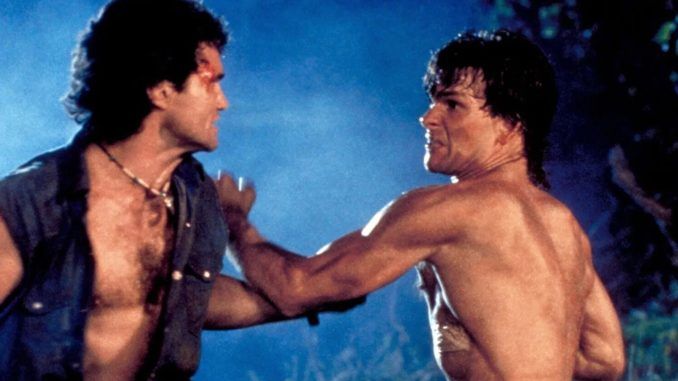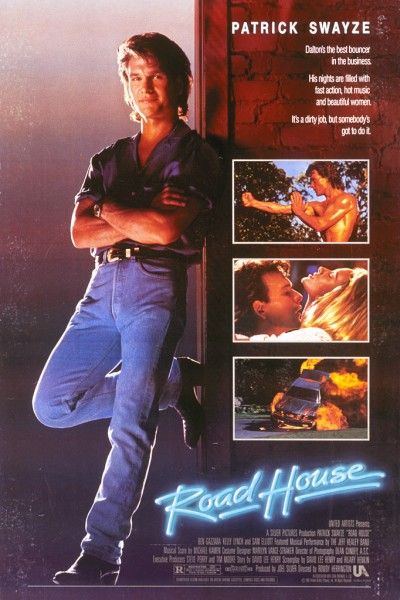
Rating: B-
Dir: Rowdy Herrington
Star: Patrick Swayze, Ben Gazzara, Kelly Lynch, Sam Elliott
I think the term “road house” is probably largely an American institution, and one wonders whether it has survived the steady crackdown on drink-driving. While there are tiers of such establishments – the first one in which we see Dalton (Swayze) working is clearly upper-class as road houses go – they don’t seem the kind of place for designated drivers to order a Diet Pepsi. I’ve been in some dodgy pubs in my younger days, but can still count on one hand the number of actual bar fights I’ve seen. Here, they seem to break out on a strict schedule, every quarter-hour. It’s to the Double Deuce in Jasper, Missouri that Dalton relocates, hired to bring it under control for owner Frank Tilghman.
However, the bar and the town in general have bigger problems, in the shape of sleazy businessman Brad Wesley (Gazzara). Dalton annoys Wesley in a variety of ways. He fires Wesley’s nephew for skimming bar takings. Romances local doctor Elizabeth Clay (Lynch), whom Wesley fancies. Bypasses Wesley’s efforts to cut off alcohol supplies to the Double Deuce. And, on multiple occasions, punches out the minions sent to the bar to disrupt things, especially after Dalton’s efforts turn the bar from a war-zone to the hippest joint in Jasper. [Though since Wikipedia tells me it has a population of about a thousand, I suspect the competition for that title is not enormous] Escalation seems inevitable, and… yeah, things escalate.
 In some ways, Dalton feels like a prototype of Jack Reacher, travelling from town to town as a “cooler”, using both brawn and not inconsiderable brain to defeat the bad guys. Dalton has a PhD in philosophy, which helps explains his delivery of koan-like nuggets, such as “Nobody ever wins a fight.” The bulk of the film would beg to differ on that matter, Dalton largely mowing down opponents as necessary, the appropriately-named director capturing the large quantities of tavern carnage with a clear eye and obvious enthusiasm. These elements are fun, as is Elliott’s portrayal of Dalton’s mentor, though it’s hard not see him as Virgil Earp from Tombstone, with lines like “When a man sticks a gun in yer face, you got two choices; you can die or you can kill the motherfucker.”
In some ways, Dalton feels like a prototype of Jack Reacher, travelling from town to town as a “cooler”, using both brawn and not inconsiderable brain to defeat the bad guys. Dalton has a PhD in philosophy, which helps explains his delivery of koan-like nuggets, such as “Nobody ever wins a fight.” The bulk of the film would beg to differ on that matter, Dalton largely mowing down opponents as necessary, the appropriately-named director capturing the large quantities of tavern carnage with a clear eye and obvious enthusiasm. These elements are fun, as is Elliott’s portrayal of Dalton’s mentor, though it’s hard not see him as Virgil Earp from Tombstone, with lines like “When a man sticks a gun in yer face, you got two choices; you can die or you can kill the motherfucker.”
Less successful to me were the romantic elements, with Elizabeth apparently there, purely in order to stop things getting too homo. This affirmation of heterosexuality is probably needed when you have so many shots of a shirtless Swayze, as well as one of Wesley’s minions telling Dalton, “I used to fuck guys like you in prison.” But he’s a bad guy, so it’s fine. All the kissy-face stuff isn’t very interesting, and probably results from my low opinion of Swayze as a romantic lead. As a weird cross between Bruce Lee and The Dude, he’s fine. It all feels almost older than it is, sometimes seeming to take place in the sixties – the lack of black characters, for instance. I’m curious whether the remake will “fix” this – probably at the expense of the female nudity.
